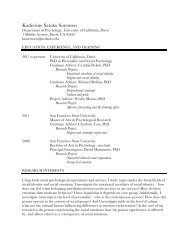The Psychology of Creativity:
The Psychology of Creativity:
The Psychology of Creativity:
You also want an ePaper? Increase the reach of your titles
YUMPU automatically turns print PDFs into web optimized ePapers that Google loves.
History <strong>of</strong> <strong>Creativity</strong> Research 3<br />
<strong>The</strong> Early History <strong>of</strong> <strong>Creativity</strong> and Genius<br />
Historians <strong>of</strong> psychology are fond <strong>of</strong> quoting the claim made by Ebbinghaus (1903), the great German<br />
psychologist, that “psychology has a long past, yet its real history is short” (p. 3). <strong>The</strong> discipline’s history was short<br />
because psychology did not become a formal discipline until the 1870s. That was when the field’s “father,”<br />
Wilhelm Wundt, published his first books on “physiological psychology” and founded the first laboratory devoted to<br />
psychological research. On the other hand, the field has a long past because certain psychological issues – like the<br />
mind-body problem, the nature-nurture issue, the status <strong>of</strong> abstract ideas, and the origins <strong>of</strong> knowledge – form part<br />
<strong>of</strong> the European intellectual tradition stretching all the way back to the ancient Greeks. In fact, Aristotle is <strong>of</strong>ten<br />
credited with authoring the first purely psychological treatises, such as his On the Soul and On Memory and<br />
Reminiscence. <strong>The</strong> philosopher Alfred North Whitehead (1929/1978) once observed that the “the safest general<br />
characterization <strong>of</strong> the European philosophical tradition is that it consists <strong>of</strong> a series <strong>of</strong> footnotes to Plato” (p. 63).<br />
To a lesser extent, a similar statement might describe Aristotle’s status in psychology’s past, even if not in its<br />
history. It was not until the philosophical revolution launched by Francis Bacon and René Descartes in the 17th that<br />
Aristotle’s influence on psychological thought was severely compromised.<br />
Yet, strangely, the psychology <strong>of</strong> creativity cannot have its own past projected back to Greek antiquity.<br />
Neither Plato nor Aristotle nor anyone else <strong>of</strong> those times had anything useful to say about the phenomenon.<br />
Although many natural phenomena were exposed to logical analysis and empirical inquiry, creativity was not<br />
generally included among them. This neglect probably reflects the strong association <strong>of</strong> creativity with divinity.<br />
Virtually all <strong>of</strong> the world’s religious systems possess “creation myths” in which one or more gods or divine beings<br />
demonstrate superlative creative powers. <strong>The</strong> Greeks had their fare share <strong>of</strong> such myths. Especially intriguing from<br />
the standpoint <strong>of</strong> this essay is the doctrine <strong>of</strong> the Muses. According to the story, Zeus, the reigning god in the Greek<br />
pantheon, fathered nine daughters, each <strong>of</strong> whom presided over a different domain <strong>of</strong> human achievement. In<br />
particular, these Muses were responsible for heroic or epic poetry, lyric and love poetry, sacred poetry, tragedy,<br />
comedy, music, dance, astronomy, and history. Each Muse was thought to provide a guiding spirit or source <strong>of</strong><br />
inspiration for the mortal creator. This usage underlies several commonplace expressions, such as to say that one has<br />
lost one’s Muse when one has run out <strong>of</strong> creative ideas. Given this conception, human creativity remained<br />
subordinate to divine creativity.<br />
<strong>The</strong> religious roots <strong>of</strong> creativity is also apparent in the concept <strong>of</strong> genius, a notion that would later become
















